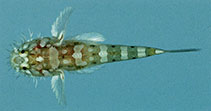| Family: |
Gobiidae (Gobies), subfamily: Gobiinae |
| Max. size: |
2 cm SL (male/unsexed) |
| Environment: |
demersal; marine; depth range 1 - 15 m |
| Distribution: |
Indo-West Pacific. |
| Diagnosis: |
Dorsal spines (total): 7-7; Dorsal soft rays (total): 8-9; Anal spines: 1-1; Anal soft rays: 8-9. Characterized by light tan body color with row of five horizontally elongate black spots along middle of side; presence of row of smaller dark spots along lower side of body; nape, back and upper caudal peduncle with six brown saddles; joined pelvic fins, relatively long , extends beyond anal fin; rounded caudal fin; longitudinal scale series 23-25; absence of scales on nape, cheek, opercle, breast and anterior body; numerous, elongate, fleshy barbels and flaps on head; depth of body 5.6-6.3 in SL (Ref. 90102). |
| Biology: |
Inhabits sand-rubble bottoms, usually in surge channels or on exposed outer edge of reefs in 1-15 m (Ref. 90102). Burrows in sand adjacent to coral or rock (Ref. 2798). |
| IUCN Red List Status: |
Least Concern (LC); Date assessed: 04 February 2009 Ref. (130435)
|
| Threat to humans: |
harmless |
Source and more info: www.fishbase.org. For personal, classroom, and other internal use only. Not for publication.

